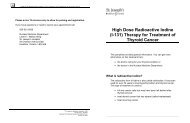November CONN Nov3.qxd - St. Joseph's Healthcare Hamilton
November CONN Nov3.qxd - St. Joseph's Healthcare Hamilton
November CONN Nov3.qxd - St. Joseph's Healthcare Hamilton
You also want an ePaper? Increase the reach of your titles
YUMPU automatically turns print PDFs into web optimized ePapers that Google loves.
Nephrologists make largest physician<br />
gift in <strong>St</strong>. <strong>Joseph's</strong> history<br />
Recently, two members of the <strong>St</strong>.<br />
<strong>Joseph's</strong> family - Drs. Alistair Ingram<br />
and Joan Krepinsky - made the largest<br />
physician gift in our hospital's history.<br />
The pair generously committed<br />
$500,000 to <strong>St</strong>. <strong>Joseph's</strong> <strong>Healthcare</strong><br />
Foundation to establish a Young<br />
Investigator's Award in Nephrology<br />
Research.<br />
Drs. Ingram and Krepinsky are not just<br />
co-workers in <strong>St</strong>. <strong>Joseph's</strong> Division of<br />
Nephrology, they're a husband and wife<br />
duo with a vision to ensure that kidney<br />
research continues to flourish at<br />
SJHH. The new award will help a<br />
young scientist transition from their<br />
postdoctoral training to an independent<br />
research career as an Assistant<br />
Professor at McMaster University.<br />
On Sept. 23, 2008, an event was held<br />
to honour the couple and announce<br />
their remarkable gift to the hospital.<br />
Dr. Krepinsky spoke to a gathering of<br />
physicians, researchers, and friends of<br />
the Foundation, and imparted their<br />
reasons for giving.<br />
"We both have a keen interest in basic<br />
science research, and we've watched<br />
as this area has grown rapidly in our<br />
division. We know first hand the high<br />
quality of the work being done here at<br />
<strong>St</strong>. <strong>Joseph's</strong> and this was the obvious<br />
place for us to look when we were<br />
discussing charitable giving,” explained<br />
Dr. Krepinsky. “In our own careers,<br />
we have experienced and observed how<br />
difficult it can be for young researchers<br />
to scrape together a salary, secure grant<br />
support, and find a little 'breathing<br />
space' to see if they have what it takes<br />
to pursue a career in research. It is our<br />
hope that this donation will give junior<br />
Drs. Alistair Ingram and Joan Krepinsky<br />
researchers the necessary training, as<br />
well as a head start, in establishing a<br />
career in nephrology research and in<br />
doing so to help our division to<br />
continue its growth, and help our<br />
patients gain access to the latest<br />
findings in this field."<br />
Dr. Ingram acknowledged the hospital<br />
paved the way for their donation by<br />
showing confidence in what could be<br />
achieved in the field of nephrology<br />
research at <strong>St</strong>. <strong>Joseph's</strong>. He stated:<br />
"The hospital has invested in the future<br />
of the Nephrology Research Program<br />
by providing exceptional laboratory<br />
space and critical research funding.<br />
Once we saw how committed SJHH<br />
was to the program, we decided it was<br />
time to make a lead donation and in<br />
the hopes that we may inspire other<br />
private donors."<br />
Foundation President Rob Donelson<br />
thanked the couple for their extraordinary<br />
gift and imparted, "We're very grateful,<br />
not only for the generous contribution<br />
to our hospital made by Drs. Ingram<br />
and Krepinsky, but also for their<br />
tremendous work in advancing patient<br />
care. Their belief in the care that <strong>St</strong>.<br />
<strong>Joseph's</strong> <strong>Healthcare</strong> provides to our<br />
community, and their investment in its<br />
future, is extraordinary."<br />
6<br />
Body Watch<br />
What is a Glycemic Index<br />
and what are its benefits?<br />
Carbohydrates have developed<br />
somewhat of an unfair negative<br />
reputation. After eating any<br />
carbohydrate containing foods your<br />
blood glucose levels will rise, however<br />
not all carbohydrates have the same<br />
effect on your body. The speed and<br />
extent to which blood glucose levels<br />
increase is largely dependent on what<br />
is known as a "Glycemic Index" (GI).<br />
A glycemic index categorizes foods<br />
based on their ability to raise blood<br />
sugar levels. Foods are classified as<br />
having a High, Medium or Low GI.<br />
High GI foods will raise your blood<br />
sugars further and faster than medium<br />
or low GI foods. Low GI foods have<br />
been shown to help control cholesterol<br />
and appetite and lower your risk<br />
of heart disease and type two diabetes.<br />
Vegetables, fruits and low fat milk<br />
products along with whole grains are<br />
generally considered low GI.<br />
What are some easy ways to increase<br />
low GI foods in your diet?<br />
Try... Instead of...<br />
Pumpernickel Bread White Bread<br />
Sweet Potatoes Baking Potatoes<br />
Oatmeal Rice Crispies<br />
Long Grain Rice Short Grain Rice<br />
To learn more about the the glycemic<br />
index, speak to a Registered Dietitian<br />
or go to http://www.diabetes.ca/<br />
for-professionals/resources/<br />
nutrition/glycemic-index/<br />
Body Watch is a monthly column on health<br />
and nutrition written by the Dietitians of<br />
SJHH and Dietitians of Canada.














